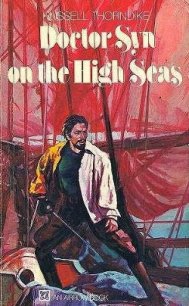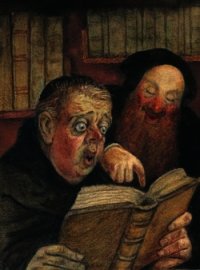The COURAGEOUS EXPLOITS OF DOCTOR SYN - Thorndike Russell (книги онлайн полные TXT) 📗
with his wedding, since the girl had refused, so far, to set any date concerning that ceremony.
The man’s story spread till certain members of the Scarecrow’s gang put two and two together. Quickly
suspicious they came to the conclusion that since the Captain and Doctor Syn were known to be the two archenemies of the Scarecrow and therefore of themselves, George Lee must be guilty of carrying secret information
against them, and being in the know about the proposed tobacco run concealed in the cargo of bones, they guessed,
perhaps naturally, that the news was out about the casks, and given away to their enemies by the young cooper.
Now as there had been no call from the Scarecrow to meet in full conclave at the deserted Oast House at
Doubledyke Farm, a section of the gang resolved to take the matter into their own hands, arguing that it would
delight the Scarecrow to find that an unknown enemy had not only been discovered, but very severely punished.
It happened to be customary for the lovesick young cooper to repair to the ‘Red Lion’, and to whistle under her
window after she had been dispatched to bed, in the fond hope that she might be coyly encouraged to appear at the
casement and signal, or better still whisper personally, a fond good-night.
When Polly Henley felt in a romantic mood herself, she would, if it seemed safe, actually open the casement of
her bedchamber which looked not upon a side alleyway, in order to whisper sweet nothings to the upturned face of
her swain.
Now this Friday night happened to be one of a p/itch-dark sky, and there was no artificial light in the alleyway.
No lamp upon the wall. The only light which could cheer the sinister passage against the inn wall was from Polly’s
little candlelight, which shone through her small lead-rimmed casement.
Having heard the landlady about on the staircase, Polly contented herself, on this occasion, with appearing at the
window, and waving to hew swain below, whose upturned white face was all that she could see. She thought it
unwise to risk opening the casement, as the hinge squeaked. Having satisfied herself that her lover was loyally at
his post, she drew one of the curtains, and undressed behind its protection. But the cooper, longing for a word with
her, remained patiently beneath his shrine, hoping against hope that when she had extinguished her candle she would
lean out and whisper a good-night.
His whole mind being riveted upon this expectation he was not alert to anything else, and utterly forgetful of the
Captain’s warning not to walk the town by night. He therefore neither heard nor saw the muffled-up figure of a man
that stole along the alley. The cudgel that cracked him on the head brought him down unconscious and without so
much as a groan.
The girl, hearing the noise of the blow, peeped out, but could see nothing, and since the upturned face had
disappeared, she conjectured that the young cooper had been scared by the noise, whatever it might have been, and
had wisely made himself scarce.
She waited a little, hoping that he would return. But his face was no longer to be seen in the candlelight, and
when she blew it out she could see nothing at all, because of the thick darkness.
Although she would have been well content to slip into bed, leaving him to his vigil, she felt peeved that a little
noise from someone around the inn could have frightened him away for good, though had he returned to his post she
would not have been above reprimanding him the next day for risking a scandal to her good name. The assailant did
not greatly care whether or no his victim was alive, since he had in his hand a paper, specially prepared, which he
considered cleared him from any possible charge of murder. This paper he now pressed into the cooper’s still hand.
By the time the landlord of the “Red Lion” opened the door to see what the noise might have been, the muffled
figure had gone, and the landlord did not see the crumpled body.
When the cooper came to his senses with a throbbing head, it took him some little time to recollect where he was.
Indeed, his first thought was of the Captain, and that his warning had come tragically true. He imagined that he
must be aboard some ship, a victim of the Press Gang.
Actually he had fallen against a wooden door, which suggested, as he touched it, the side of a ship. He began
wondering whether his adored one had heard him fall, and whether he had cried out for help. It annoyed him to
think that he had been given no chance to put up a fight. He would not have minded so much if he had gone down
in the midst of a titanic struggle. She would have thought the better of him.
He had not told Polly of his journey to Dymchurch. Neither had he mentioned the warning which the Captain
had given him in reference to the Press gang. He wished that he had at least told her that, so that she would guess
what had happened and to the Captain on his behalf. If, on the other hand, she had heard nothing of the blow and his
falling into their hands, she would be wondering why he had disappeared, always supposing that she had deigned to
look out of the casement. Certainly when he failed to put in an appearance upon the next evening she would think
him faithless and soon set her cap at some other man. This thought increased his mental anguish, while his physical
pain increased as he began to move.
As soon as he discovered that he was not bound, he groped about with the intention of finding out in what sort of
a place he was confined. Slowly and painfully he raised himself into a sitting position. He could detect no
movement as of a ship at sea, so though that the vessel had not yet weighted anchor. Therefore, if escape was to be
made, now was the time. In putting up his hand to feel if he could touch any ceiling or floor-deck above, he found
that a crunched piece of paper was clutched in his hand. Although he could distinguish it as paper, it was too dark to
examine it, to be one of the ribs of the ship, he raised himself slowly, fearful of striking his aching head against the
deck above. Remembering tales of other men who had suffered at the hands of the Press Gang, but had escaped, he
conjectured that he must be in the bilge, which was the common prison for victims previous to leaving harbour.
But he soon realized that the floor beneath him was not sloped like the bottom of a ship. Also it was not wood
but earth at that. He eventually stood upright, and stretching up his arms could feel nothing above him. He began to
edge his way along the side, and felt that the wood had given place to brick. And then, s his eyes became
accustomed to the darkness, he made out that he was not confined at all, but was in the open air, and at last the
building close to him resolved itself into the ‘Red Lion’.
His thankfulness at this discovery knew no bounds, which compensated him for his throbbing head and aching
limbs. He realized that he must have lain beneath Polly’s window for a long time, for the inn was shut and quiet,
and so with a gesture of good-night towards Polly’s darkened casement, he made the best of his way back to his
lodgings, taking every precaution to listen at every corner, so that he would not be surprised again. He could not
imagine why he had been knocked out by the Press Gang, and then left for dead. Why had they not shipped him
abroad after attacking him? Had he been rescued by some good Samaritans who bore a hatred for the Press Gang
methods? There wee many such fellows in Hythe he well knew. But then, why had they left him after the rescue?




